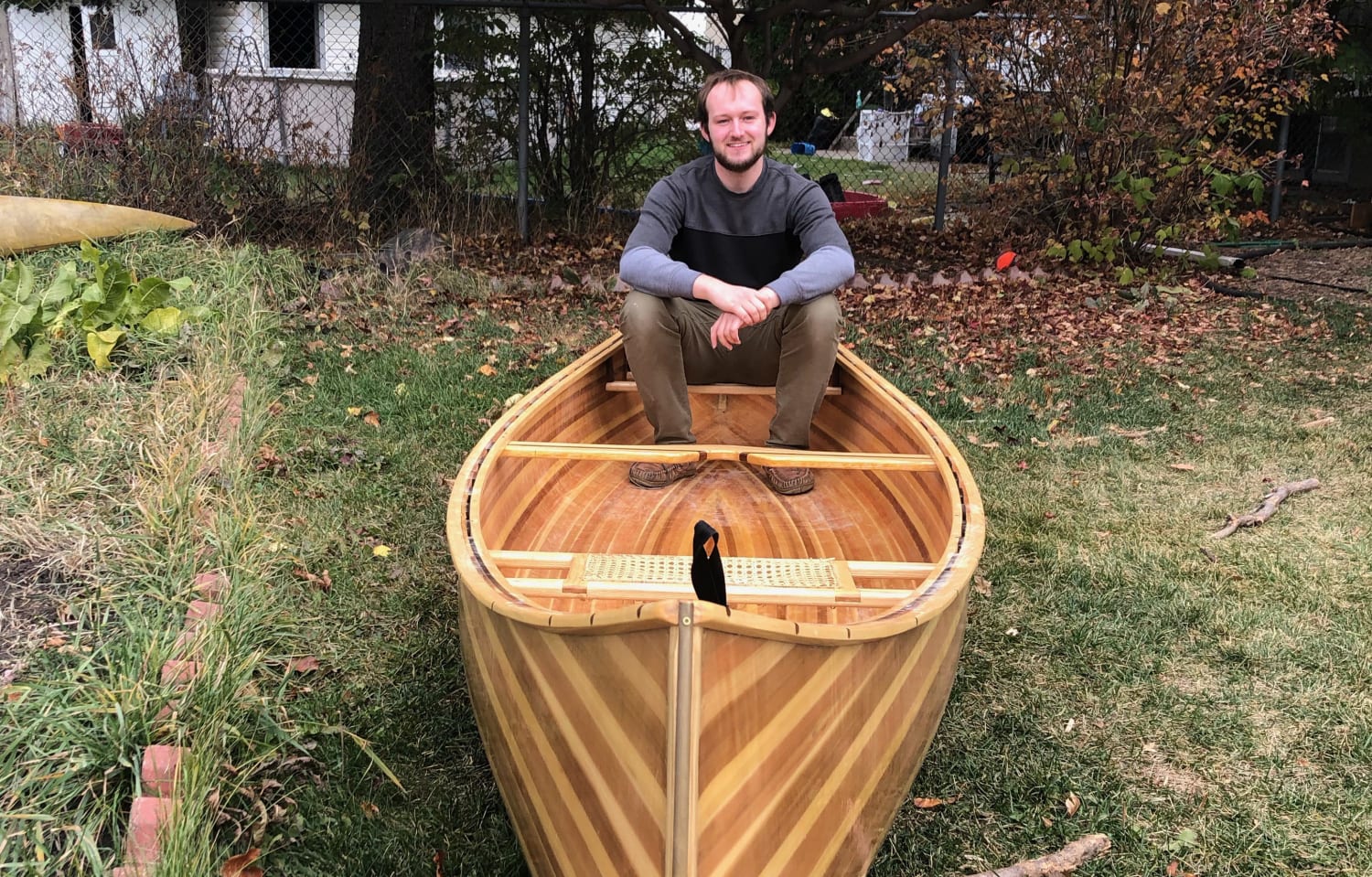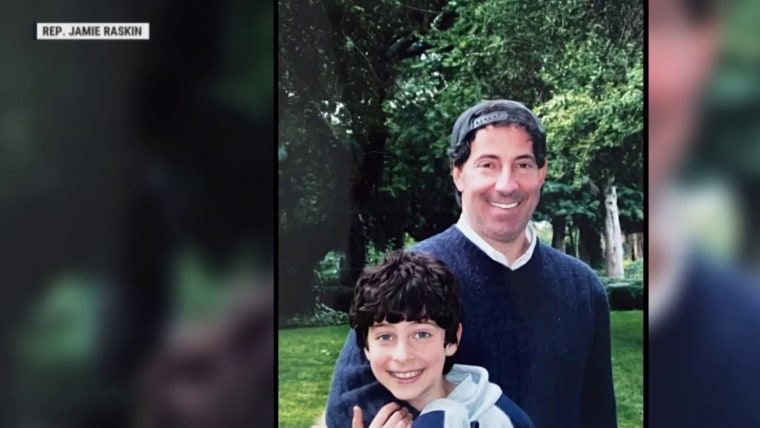Four years ago, our 20-year-old son was admitted to a psychiatric hospital after trying to kill himself. That night, my husband implied that I bore some of the blame.
“You kind of normalized suicide because you talked about your father all the time,” he said.
“I talked about it because it’s how my father died,” I snapped. “It’s not like I was saying, ‘Hey, kids, my dad killed himself when I was 13. You should try it sometime!’”
I was reminded of that conversation when I watched a recent MSNBC “Morning Joe” interview with Maryland Rep. Jamie Raskin, the House impeachment manager whose 25-year-old son, Tommy, died by suicide a week before the Jan. 6 insurrection. As he does in the MSNBC documentary “Love and the Constitution,” airing Sunday, Raskin speaks openly about suicide — something he wishes he’d done when his son was alive.
“I fault myself for, among many other things, not using the word suicide and [not] forcing conversations about suicide in our household,” Raskin told co-host Willie Geist on “Morning Joe.” “Not talking to somebody who’s depressed about suicide is like not talking about sex to a teenager. You may think that you’re somehow suppressing the possibility of its emergence later, but you’re not.”
I knew just what he meant. The irony of my husband’s observation was that, while it might have seemed to him as if I was comfortable talking about suicide and did so all the time, there’s a significant difference between telling your kids how their grandfather died and listening to your son tell you he wants to kill himself. And that I hadn’t done, nor had I ever wanted to.
When my son, Noah, came to me in January of 2018 and said he was depressed and thought he should see a psychiatrist, I couldn’t bring myself to say “suicide.” I asked if he was thinking of hurting himself. He shrugged, a gesture that invited further questions. Instead of pressing him, I ended the conversation and called a child psychiatrist friend for advice. Then I passed her suggestions on to Noah, who made appointments to see his doctor and a care provider at his university health center.
I didn’t want to talk about suicide with my possibly suicidal son. Like Raskin, I was afraid — but not of encouraging him. I believed that if he told me he intended to end his life, it would be my responsibility to stop him. I hadn’t been able to stop my father. I had no idea how to stop my son. Avoiding the topic seemed to be the safest option.
Two months later, even more depressed after not being able to get an appointment with a psychiatrist, Noah found someone who would listen: his cousin, a medical student. She determined that he was a danger to himself and drove him to the emergency room. From there he was sent to a psychiatric hospital.
Noah had been at the hospital for a couple of weeks when my 22-year-old daughter signed herself and me up for a two-day Mental Health First Aid course. After that she signed us up for a three-hour suicide prevention course.
At both, I learned that when someone is suicidal, you’re supposed to engage them in conversation and that talking about it can be a deterrent. It shows you care and are willing to listen. And it can provide much-needed perspective. As one of the course coordinators said, “For a lot of individuals, when they’re in a depressive state and they can’t see light at the end of their tunnel, they feel isolated and alone. That’s the only path they can see, not realizing that they are impacting so many other people.”
My first opportunity to put this new knowledge into practice was the day Noah was discharged after his six-week stay. In the car on the way home, he informed me he was still thinking of killing himself. I was terrified. Instead of giving him a chance to elaborate, I shut down the conversation by lecturing him about why that was a bad idea. I have no good explanation for why I didn’t use my newfound knowledge to give him a chance to elaborate, or why I didn’t turn around and drive him back to the hospital. Other than this: I was petrified and grieving — my mother had died just before Noah was hospitalized. I was not thinking logically. Those aren’t good excuses, I know, but they’re the truth.
Three days later, Noah tried to kill himself. It was the 44th anniversary of the day my father’s body had been pulled from the lake where he’d drowned himself. The timing was coincidental—Noah knew my dad had disappeared before he died, though not the date the body had been found. But to me, the timing was a sign: I was going to be the person who lost two of the most important men in her life to suicide.
I stopped believing my son could get better. Surprisingly, abandoning hope was what gave me the freedom to have a real conversation with him about ending his life. I didn’t ask about his plans because knowing that he was clearly going to carry through with them was all the information I could stomach.Instead, I wanted him to know how I’d feel if he succeeded.
We were sitting at a beat-up picnic table in the sad, treeless garden outside the hospital where Noah was stuck, waiting in the emergency room for a bed to open at the psychiatric hospital. Spring was barely a month old. Patches of dirty snow still speckled the not-quite-green grass.
“I love you,” I said.
“You shouldn’t need to say that,” he replied.
“I want to make sure you know,” I said. I didn’t mention that I still wonder if I told my father that I loved him when he dropped me off at school the last morning of his life.
“I can’t imagine a world without you in it,” I said, and Noah pulled me close.
During the six weeks he’d been in the hospital, he’d repeatedly told us his life was his own, it was his to end if he chose. Now I reminded him his life was part of ours. My goal wasn’t to make him feel guilty, and I believe my tone reflected that. What I wanted was for him to understand that his death would create a hole we could not fill, that he’d be dead and his pain would be gone, but we’d spend the rest of our lives picking up pieces of hurt.
“I know you can’t see that now,” I said. “But I hope you will.”
I knew as I spoke that I had no control over Noah’s actions. But I also knew if I failed to tell him what I was thinking and he ended his life, I would never forgive myself for not doing everything I could. And the only thing I could do was tell him how I felt.
I don’t take credit for Noah’s recovery, which started with the medical staff and social worker at his second hospital stay who involved us, his family, in his care, and who helped him to manage the obsessive compulsive issues and perfectionism that were contributing to his depression. But I do give thanks that he is here, alive, thriving and making the most of his life.
My heart goes out to the Raskin family. And I hope Raskin’s book “Unthinkable” will get us all talking about how important it is to talk about suicide. As terrifying as it is to hear someone you love tell you, “I want to die,” that conversation is one you need to have.
Source: | This article originally belongs to Nbcnews.com










